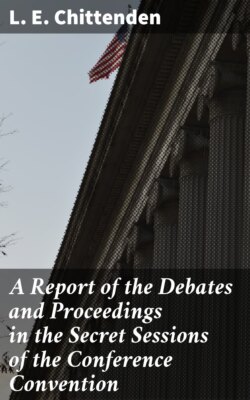Читать книгу A Report of the Debates and Proceedings in the Secret Sessions of the Conference Convention - L. E. Chittenden - Страница 17
На сайте Литреса книга снята с продажи.
PROPOSALS OF AMENDMENT TO THE CONSTITUTION
OF THE UNITED STATES.
ОглавлениеArticle 1. In all the territory of the United States not embraced within the limits of the Cherokee treaty grant, north of a line from east to west on the parallel of 36 degrees 30 minutes north latitude, involuntary servitude, except in punishment of crime, is prohibited whilst it shall be under a Territorial government; and in all the territory south of said line, the status of persons owing service or labor, as it now exists, shall not be changed by law while such territory shall be under a Territorial government; and neither Congress nor the Territorial government shall have power to hinder or prevent the taking to said territory of persons held to labor or involuntary service, within the United States, according to the laws or usages of the State from which such persons may be taken, nor to impair the rights arising out of said relations, which shall be subject to judicial cognizance in the federal courts, according to the common law; and when any territory north or south of said line, within such boundary as Congress may prescribe, shall contain a population required for a member of Congress, according to the then federal ratio of representation, it shall, if its form of government be republican, be admitted into the Union on an equal footing with the original States, with or without involuntary service or labor, as the Constitution of such new State may provide.
Article 2. Territory shall not be acquired by the United States, unless by treaty; nor, except for naval and commercial stations and depots, unless such treaty shall be ratified by four-fifths of all members of the Senate.
Article 3. Neither the Constitution, nor any amendment thereof, shall be construed to give Congress power to regulate, abolish, or control within any State or Territory of the United States, the relation established or recognized by the laws thereof touching persons bound to labor or involuntary service therein, nor to interfere with or abolish involuntary service in the District of Columbia without the consent of Maryland and without the consent of the owners, or making the owners who do not consent just compensation; nor the power to interfere with or prohibit representatives and others from bringing with them to the City of Washington, retaining, and taking away, persons so bound to labor; nor the power to interfere with or abolish involuntary service in places under the exclusive jurisdiction of the United States within those States and Territories where the same is established or recognized; nor the power to prohibit the removal or transportation, by land, sea, or river, of persons held to labor or involuntary service in any State or Territory of the United States to any other State or Territory thereof where it is established or recognized by law or usage; and the right during transportation of touching at ports, shores, and landings, and of landing in case of distress, shall exist. Nor shall Congress have power to authorize any higher rate of taxation on persons bound to labor than on land.
Article 4. The third paragraph of the second section of the fourth article of the Constitution shall not be construed to prevent any of the States, by appropriate legislation, and through the action of their judicial and ministerial officers, from enforcing the delivery of fugitives from labor to the person to whom such service or labor is due.
Article 5. The foreign slave-trade and the importation of slaves into the United States and their Territories, from places beyond the present limits thereof, are forever prohibited.
Article 6. The first, second, third, and fifth articles, together with this article of these amendments, and the third paragraph of the second section of the first article of the Constitution, and the third paragraph of the second section of the fourth article thereof, shall not be amended or abolished without the consent of all the States.
Article 7. Congress shall provide by law that the United States shall pay to the owner the full value of his fugitive from labor, in all cases where the marshal or other officer, whose duty it was to arrest such fugitive, was prevented from so doing by violence or intimidation, or when, after arrest, such fugitive was rescued by force, and the owner thereby prevented and obstructed in the pursuit of his remedy for the recovery of such fugitive.
Mr. BALDWIN:—I have not been able to concur in opinion with those members of the committee who have presented the propositions just submitted. I do not deem them fair or equitable to the Free States, nor do I think they are likely to secure approval in those States. As one member of the minority, I have drawn up a report embodying my own views and perhaps those of some of my colleagues, which I now present for the consideration of the Conference:
